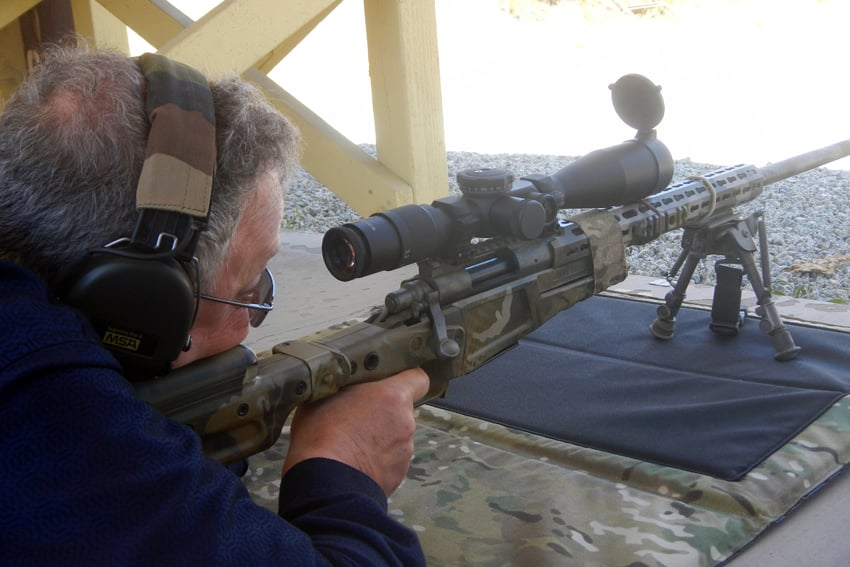Do We Really Lose Fine Motor Skills under Shooting Stress?
Do We Really Lose Fine Motor Skills under Shooting Stress?
There is a growing minority of firearms industry professionals that are tired of the status quo. Some professionals refuse to question things that are considered “commandments” in regards to firearms training. We are questioning these things, learning, and changing the industry; challenging ingrained habits bit by bit.
For example: the “Weaver” stance versus “Modern Isosceles” stance.
The “weaver” stance came about in 1959 and gained popularity in the ’60s. While it’s been an accepted standard since then, about 10 years ago a growing group came onto the scene using the “modern isosceles,” which is now slowly taking over as the standard.
We are now seeing more and more industry professionals thinking outside the box. Thanks to Internet-based communications and the sharing of ideas, we are seeing rapid changes in the industry. This is a good thing.
This article centers on a statement made in most firearms training classes of all types including mine (in the past, but not lately):
“Under stress we lose the ability to use fine motor skills. Therefore, keep things as simple as possible: don’t use the slide release, palm slap the “paddle” (on an AR), etc.”
Motor Skills
First, let’s define gross and fine motor skills.
- Gross Motor Skills
- Gross motor skills involve the large muscles of the body that enable such functions as walking, kicking, sitting upright, lifting, and throwing a ball. Gross motor skills are important for major body movement such as walking, maintaining balance, coordination, jumping, and reaching.
- Fine Motor Skills
- Fine motor skills are the coordination of small muscle movements which occur e.g., in the fingers, usually in coordination with the eyes. In application to motor skills of hands (and fingers) the term dexterity is commonly used. The abilities which involve the use of hands develop over time, starting with primitive gestures such as grabbing at objects to more precise activities that involve precise eye—hand coordination. Fine motor skills are skills that involve a refined use of the small muscles controlling the hand, fingers, and thumb.
If we lose the ability to use fine motor skills under stress, we should be reduced to babbling, kicking, screaming idiots. That is what those who teach the firearms industry status quo are suggesting.
My experience teaching martial arts for many years has shown me that fine motor skills can be used under stress. Watch any Mixed Martial Arts fight where a guy is getting choked out and he manages to do some Jiu-Jitsu move to get out of it. Was he just using gross motor skills? Doubt it.
Procedural Memory
If you train properly — and I don’t mean hitting the range once a year, or an in-service class twice a year, or a professional firearms class every two to three years — you will develop something called procedural memory.
You thought I was going to say muscle memory, didn’t you? When needed, procedural memories are automatically retrieved and utilized for the execution of the step-by-step procedures involved in both cognitive and motor skills; from tying shoes to flying an airplane. This process occurs without the need for conscious control or attention. Procedural memory is a type of long-term memory. More specifically, it’s a type of implicit memory.
Here is an example: I use the slide release/stop. It works for me with the weapon system I use. According to a lot of firearms instructors out there, I will not be able to get my weapon to function in a stressful situation — despite that being what it is designed for! On a well-designed weapon the controls are ergonomically designed to fit the hand (With some manufacturers… cough, cough, Hi-Point… you wonder at the size or shape of the hand they designed it for or why some choose to trust their lives to $200 guns!)
If I can’t hit the button to release the slide under stress, then why have a gun to begin with? For the weapon to be of any use I have to squeeze the trigger (and as a full time instructor I spend a majority of my time fixing trigger manipulation problems). Trigger manipulation, like hitting the side release button, is definitely a fine motor skill.
The next time someone tells you that using the slide stop will get you killed when your fine motor skills go away under stress, ask them “If I lose the ability to use fine motor skills, how will I squeeze the trigger?”
“Doc” up!
Motor Skill and procedural memory definitions via Scribd.com and Wikipedia, image via Royal Marines Museum











Discussion